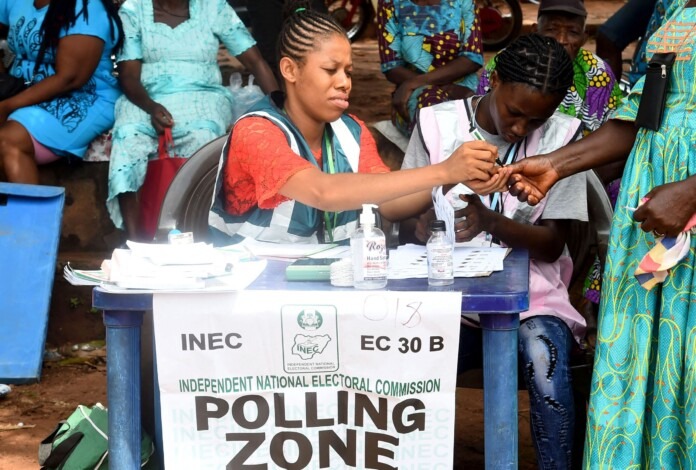
By Palma Ileye
Coalition of Northern Groups, CNG, has asked the Northern voters to resist the temptation of voting along religion, tribe and political party lines ahead of the 2023 general election.
The coalition noted that hunger, inflation was stalking millions of northern communities thereby making life difficult by the day.
It also pointed out that, “people are losing jobs, businesses are closing down, infrastructures are decaying, young people are losing hope, hospitals are full of people who suffer mysterious illnesses, and they cannot afford the fees.”
CNG, in a Communique issued at the end of a two-day retreat of CNG, by its Spokesperson Abdul-Azeez Suleiman, urged Northerners to ask those seeking their votes to provide comprehensive programmes for the development of the region and promotion of their interest.
The group demand an immediate, transparent and comprehensive investigation into growing concerns over rampant defence corruption running into trillions of Naira.
According to the Communiqué: “Resisting the temptation to vote sole across political party, region, tribe or religious basis and instead, choose to install a credible leadership that could see the nation through and out of its current situation, from if needs be, even the so called peripheral parties.
“Demand urgent government explanation on what is inhibiting the ability of Nigerian armed forces to effectively tackle the insurgent threat in the North East, banditry and kidnappings in the northwest as well as respond to the secessionist violence in the Southeast, oil bunkering in the Niger Delta, the conflict in the north central, and the threat of maritime piracy in the Gulf of Guinea.
“The unmindful, commendable rehabilitation efforts going on in the North-East, the retreat resolved to alert the nation to wake up to the magnitude of the humanitarian disaster that Boko Haram and activities of bandits have created and:
“Warn of the imminent dangers of neglecting millions of our fellow citizens who are internally displaced and hundreds of thousands of orphans, with hunger and malnourishment, previously unknown in our land becoming alarming features of existence.
“Warn that dealing with this humanitarian disasaster will require a stronger political will and deployment of the highest administrative and managerial competencies. Recognize that the simultaneous challenges of continuing the fight against Boko Haram, rehabilitating IDPs and rebuilding lives, communities and infrastructure will require the best in leadership capacities.
“Warn that the current quality of coordination of efforts, management of skills and resources and the capacities and integrity of government agencies do not do justice to the magnitude of the problems, or address the sense of urgency in dealing with an escalating disaster.
“Demand government to overhaul the existing institutional mechanisms involved in dealing with the management of the humanitarian disaster before the problem becomes much worse than it is.
The coalition noted that the rise in crime and violence in the North are associated with the disabling level of poverty, weak, inefficient, ineffective and insufficient government response, absence of political will and capacity in addition to defence corruption.
He said: “A decade-long Boko Haram conflict with no end in sight has led to one of the world’s most severe humanitarian crises with an estimated 27,000 people, most of them civilians, have killed.
“The retreat noted that some 8.4 million people in the north-east states of Borno, Adamawa and Yobe will need humanitarian aid in 2022. Of these, 2.2 million are internally displaced; 1.5 million are returnees who lack essential services and livelihoods; and 3.9 million are members of communities affected by their hosting of internally displaced people. This figure also includes the majority (an estimated 733,000) of the 1 million people in areas currently inaccessible to international humanitarian actors.
The coalition further noted that the north-central and north-west zones are afflicted with a multidimensional crisis rooted in long-standing tensions between ethnic and religious groups and involves attacks by criminal groups and banditry such as kidnapping and grand larceny along major highways.
“These rampaging gangs of heavily armed criminals continue to terrorise northwest and central states with audacious regularity and unchecked impunity stripping the government of its prerogative for the use of force and consequent loss of control of the nation’s land boarders, forests, highways, railways and airways.
“Since January 2020, about 50,000 people fled from their homes in the northwest alone, according to the International Organization for Migration. And more than 80,000 additional people have fled to neighbouring Niger Republic over the past two years.
“Between the 28th March and 3rd of April 2022, armed clashes and banditry have led to new waves of population displacement estimated at 8,812 individuals affected by the attacks.
“In Chikun LGA, a train coming from Abuja and heading towards Kaduna was attacked on 28 March 2022 affecting 923 individuals on board, with 23 injuries and 11 casualties.
“A total of 7,828 individuals were displaced to neighbouring wards in the LGAs of Giwa, Kachia and Kagarko in Kaduna State, Sabuwa in Katsina State, Bassa in Plateau State, Rabah and Wurno in Sokoto State and Talata Mafara in Zamfara State with a total of 161 casualties reported, including 100 injuries and 61 fatalities.
“Women and girls are the most vulnerable. Thousands have been abducted since the crisis began, many more face gender-based violence, including sexual violence, trafficking, and forced survival sex in exchange for food and basic items. Huge sums of money running into billions had been extorted from communities and carted into dense forests to reinforce criminal activities”.






